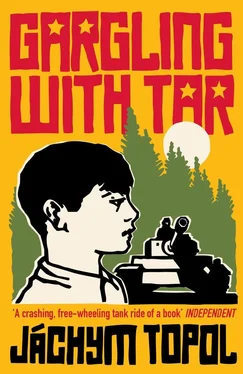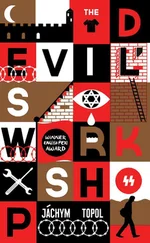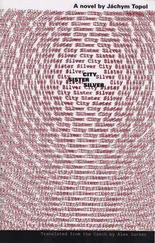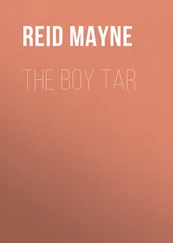In the quiet of early morning, the sighs and groans from the mountain sounded louder than in the evening. The Commander’s breathing thundered and whistled in the stone throat of the shaft, and all those cut-throats and sharpshooters down below couldn’t fail to hear it. The sighing and groaning inside the mountain went on and on, as if someone was being interrogated by mountain goblins. The Commander must have been in great pain from the wounds covering his heroic frame. For an instant I had this notion that the Commander’s agonized breathing would sweep the attackers back down the hill, but that must have been my mind wandering off into some fairy tale.
Karel crept across to us, dragging a pump-action gun behind him over the stones with his left hand, which struck me as not very careful. In his right had he was clutching a thin black flex. Dýha turned away from the rock embrasure, and he said, ‘Now?’
Karel nodded.
Martin peeped out of the mist, pulling a silly face, and with his mouth agape he silently asked the same question. Mikušinec came crawling through the mist to join us, pushing ahead of him the backpack he’d got ready to take to the Legion, and to his questioning expression Karel whispered, ‘Yep!’
The flex in Karel’s hand was fitted with a switch, something I knew about. So I waited for the big bang, and just hoped the lads had made a first-class job of laying the mines.
We waited. The men down below didn’t. Now and again we caught a jangle from the equipment of some careless twerp, or twigs cracking. These were no performing bears or jolly kangaroos climbing up to inspect Fell Crag, no sir!
But Karel suddenly whispered, ‘I can’t do it!’ and to my amazement I saw our orderly quietly blubbering.
‘Well I can!’ said Dýha, and he reached for the switch… One mighty sigh from the bowels of the mountain had just turned into a groan, as if the Commander was spurring us on… Suddenly this fire came hurtling at us out of the forest, igniting the air above our heads with a deafening crash. Around and above us, rocks were flying and stones smashed into boulders on every side, splitting into bits. I couldn’t hear a thing in that hail of stones. I could only see that Dýha was no longer next to me. Part of the cliff had broken away and collapsed into the mist. I couldn’t see anyone or anything. I lay down for safety and covered my head, the canteen digging painfully into my chest. I thought it was the canteen, but then I saw it was the black switch, and I’d rolled onto it by accident, and so it had come about that our Commander, and with him the whole of Fell Crag, was in all likelihood blown up by me.
I didn’t worry about it. I dashed into the dark of the forest undergrowth, which, as I have already noted several times, surrounded our post on Fell Crag.
I can’t relay much about my wanderings in Chapman Forest. Stuff grew in some places, but not in others, and although I wasn’t hungry, I was plagued by the most embarrassing gastric problems, and that’s bad form for any fighting man. All I had was my full canteen. I didn’t drink hard liquor, not till later, when I was talking to the gippos.
How I broke out of the encirclement and found myself alone in the forest, I’ve no idea. I could have fainted and lain in some thicket long enough for the soldiers to have withdrawn. It’s hard to say. It did cross my mind to let myself be found by the soldiers. I knew how to cope with that by then. When all’s said and done, I was just a poor orphan and I’d lost my way. But I gave up that idea after I saw the villages. I reached the villages later.
Moreover, I’d been engaged in battle in a combat unit. They’d be able to tell that from the way I moved, the way I walked, from all the things I did and knew. They’d ask questions. To be under interrogation on the opposite side from before wasn’t something I fancied.
In the thicket where I came round, I inspected the terrain, sniffed the air and also hoped I’d meet one or two Bandits. At that point I’d have welcomed an invitation to go and join the Foreign Legion. But none of the lads showed up.
Just like a Soviet scout, I looked closely at the colour and humidity of the grass, and at everything else that was there, to see if the rocks were big and without odour and scarring or, conversely, riven by ancient waters and sweetly scented. I even scrutinized the heavy clouds that merged with the waving motion of the trees. So it wasn’t at all hard to find the brook. Beside it I counted up my aching bones and I drank from it. I ate frogs and stuff.
Then I started having more dreams about Hanka. Her battered body came back to me, and with it a thrill. I imagined her wandering around Siřem, and I grew tired of life in my forest hideout. It was my first time alone, and I talked and snuggled up to Hanka all the more. It was nice in my dream. But I knew I’d have to leave.
I decided to find the gypsy shack and become a gypsy. I guess anyone who had spent part of their life on the front of a Soviet tank with his face blackened with axle grease would think that was a good idea.
I knew that Još’s valley was not far from Siřem, where the old buzzard often went in search of work.
When the lads were working on the rocks by the footbridge they would disappear to his shack. And Dýha had told me which way to go. So I followed the stream. It would bring me to the bridge, as I believed, but I mustn’t turn off into Siřem.
The stream led me to some forest ground covered in dark green, dense tussocks of grass, and the forest moss became springy underfoot. At the Home from Home we used to while away our childhood telling spooky tales about various villains who’d met their end by wandering off the poachers’ paths and getting swallowed up by the mire, so I took extra care. It was good to know that wherever I could wade through, any army vehicles, or even a pursuit platoon of giant paras, would nosedive into a deep squelching hollow of ooze. The forest was a safe place to be.
Then I saw the women trees. The frog zone had come to an end, but I was still hungry, and I had this idea that since I was so small it would also be all right to eat the smallest animals, but those ants were evil. They stung the inside of my mouth and throat real bad. Gargling with tar was nothing compared to that onslaught. I was at the spot Mr Cimbura had once told me about, or maybe I was just dreaming it, because of the ants’ poison, and this spot had no mercy on me. Mostly I’d seen the face of Czechia, whether in pictures or my mind’s eye, as lovely, but those masks of a woman’s face carved into the hard wood of the trees were meant to scare the pants off you, and they did.
The Czechia war masks were cut into the trees at about my height. Perhaps the old people that carved them weren’t very tall either. When I saw the first mask, I screamed and fell over, and felt a painful prick in my bottom. It wasn’t another ant, but an ancient arrowhead, the sort of weapon foreign armies used to use. There was something about that in The Catholic Book of Knowledge , in the chapter about the boy Sebastian. If I stamped my feet in the nettles and thick undergrowth, I’d probably hear the crunch of the rotten shields of ancient marauders, driven mad by Czechia here in her grove. I looked back at the evil face of she who was supposed to bring comfort, and headed out of Czechia’s grove, guarded by its tiny warriors. I was afraid I wouldn’t get out of there, and I’d end up going round and round in circles, and then I’d drop down and die, but I managed. Czechia had recognized me as one of her fighting men. But I lost track of the waterway I’d found. Which is how I arrived at the villages.
The cottages in the captured territory looked like they were dying. Pockmarked by bullets, burnt. An isolated shot-up cottage at the edge of the forest resembled an injured cow. I’d forgotten if the signs with the names of the villages had been shot through by the insurgents to put the fear of God into us, or if we’d fired at them for the same reason.
Читать дальше












